We post news and comment on federal criminal justice issues, focused primarily on trial and post-conviction matters, legislative initiatives, and sentencing issues.

REMINDER: FEDERAL TORT CLAIMS CAN BE A MINEFIELD
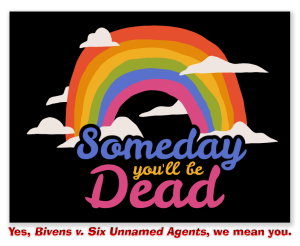 With the Supreme Court having pounded a stake through the heart of Bivens v. Six Unnamed Known Agents of the Bureau of Narcotics as a means of collecting damages for Bureau of Prisons medical errors and omissions (and, incidentally, holding the BOP accountable for providing even minimally acceptable healthcare), the only way to vindicate government medical misfeasance is a tort claim action.
With the Supreme Court having pounded a stake through the heart of Bivens v. Six Unnamed Known Agents of the Bureau of Narcotics as a means of collecting damages for Bureau of Prisons medical errors and omissions (and, incidentally, holding the BOP accountable for providing even minimally acceptable healthcare), the only way to vindicate government medical misfeasance is a tort claim action.
You cannot bring a tort action against the government unless the claim meets the restrictions of the Federal Tort Claims Act, a law which provides many ways for a pro se prisoner plaintiff to screw up.
I had a call from one such unfortunate inmate this past week. He had filed his administrative exhaustion (done on an SF-95 form, not a BP-9) and gotten the usual denial. He thought he was good to go with a lawsuit. But in his SF-95, he asked for $50,000 in damages. He was shocked to learn that his SF-95 claim for $50,000 had capped his lawsuit claim at that amount.
Two cases decided last week remind litigants of other pitfalls.
Although an FTCA action is brought under a federal statute, the laws that govern whether a BOP employee was negligent (in medical cases, whether he committed medical malpractice) are the laws of the state where the neglect happened. Most state medical malpractice statutes require that a malpractice claim be supported by an affidavit from a medical expert.
A former FCI Sandstone inmate sued, claiming that BOP health service employees had failed to properly treat him for injuries from a fall. The district court ruled that the plaintiff’s expert-disclosure affidavit required by Minnesota law was deficient and threw out the case.
Recently, the 8th Circuit agreed that the plaintiff’s affidavit “fail[ed] to satisfy the requirements of Minn. Stat. 145.682” by failing to reference the applicable standard of care, the appropriate amount of time, the proper standard of care, the preoperative standard of care, and the standard of care.
Of course, for most inmates filing FTCA actions without an attorney, access to state law materials – let alone the ability to pay for a medical expert witness – is just not going to happen.
In another case, back in 2019, an inmate sued a BOP employee in a Bivens action for sexual assault. The case was dismissed, but the prisoner appealed. Two years later, while the appeal was pending, he brought an FTCA suit with the same claim.
 The district court dismissed the FTCA claim in 2022 for lack of subject matter jurisdiction, finding that the BOP employee was not acting within the scope of her employment (an FTCA requirement) at the time of the alleged assault.
The district court dismissed the FTCA claim in 2022 for lack of subject matter jurisdiction, finding that the BOP employee was not acting within the scope of her employment (an FTCA requirement) at the time of the alleged assault.
Last week, the 4th Circuit dismissed his Bivens appeal as well. The FTCA contains a little-noticed “judgment bar” under 28 USC § 2676 that prohibits claims arising from the same event after an FTCA judgment. The 2022 FTCA dismissal thus permanently blocked the plaintiff’s Bivens appeal.
Mancini v. United States, Case No. 24-1464, 2025 U.S. App. LEXIS 9190, (8th Cir. Apr. 18, 2025)
Longworth v. Mansukhani, Case No. 21-7609, 2025 U.S. App. LEXIS 9032 (4th Cir. Apr. 16, 2025)
– Thomas L. Root


